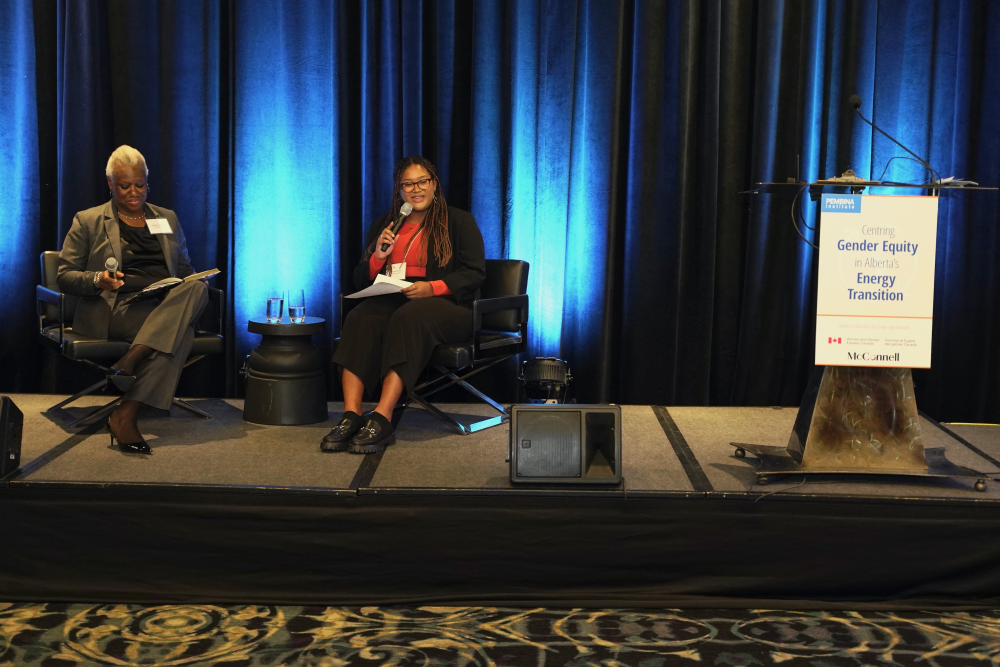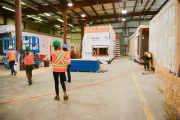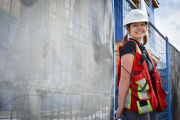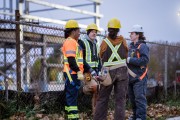 On Thursday, September 15 the Pembina Institute held a thought leaders forum to share knowledge and discuss how to action the recommendations outlined in our newly released report, Equitable Net-Zero: Recommendations to Advance Gender Equity in Alberta’s Energy Transition.
On Thursday, September 15 the Pembina Institute held a thought leaders forum to share knowledge and discuss how to action the recommendations outlined in our newly released report, Equitable Net-Zero: Recommendations to Advance Gender Equity in Alberta’s Energy Transition.
As a research intern on the Equitable Transitions team, contributing to this report over the past five months has been an amazing and insightful process for personal and professional growth. It has also given me the opportunity to strike a balance between being both a question (a student of energy policy and gender equity) and an answer (person with lived experience in this field working to make meaningful change).
The overall purpose of this forum was not only to engage with various key stakeholders, but to listen to the advice and experiences of subject matter experts to determine the Pembina Institute’s strategic direction for its energy transition work.
The day began with a blessing and speech from Elder Ruth Scalp Lock. From the Siksika First Nations, her mother Cree, her father Blackfoot, Elder Ruth was raised in her traditional culture. In 2014, she released her book, My Name is Shield Woman: A Hard Road to Healing, Vision and Leadership. Ruth is a voice for cross-cultural understanding and forgiveness.
For the forum, Elder Ruth graciously shared her journey as a community organizer, activist and residential school survivor and the importance of women in leadership. Her blessing was an important reminder that we are a collective of settlers that have a due diligence to cherish and honour the land we have the privilege of working, collaborating and growing on.
Participants ranged from academia, industry, financial services, union workers, NGOs and government which encouraged diverse, meaningful dialogue. As a co-author on this report, I was eager to hear the differing perspectives of key stakeholders from a range of different personal, academic and professional backgrounds. For me, to be in this room filled with powerful women, gender diverse people and allies highlighted the richness and importance of engaging with this community to understand their diverse ideas and perspectives in order to find the right solutions to the complex issues discussed in the report.
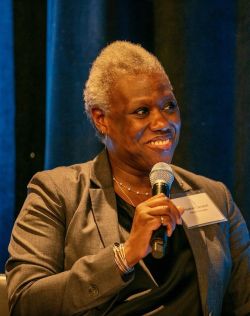 I also had the opportunity to not only be in the room with, but to interview Heather Campbell. Heather is a dedicated member of her community who continuously offers her time, resources and technical expertise to various diverse organizations. Heather is a licensed professional engineer practicing in Alberta and the executive director of clean energy at Alberta Innovates. Both of us born from Caribbean immigrants, she is someone I personally look up to.
I also had the opportunity to not only be in the room with, but to interview Heather Campbell. Heather is a dedicated member of her community who continuously offers her time, resources and technical expertise to various diverse organizations. Heather is a licensed professional engineer practicing in Alberta and the executive director of clean energy at Alberta Innovates. Both of us born from Caribbean immigrants, she is someone I personally look up to.
As a young black woman studying climate, gender, development and sustainability practices, it is rare to see myself represented so visibly, let alone conducting an interview with an intelligent and courageous professional and community leader like Heather. I never thought I would be given the platform to freely tackle and unpack my deep concerns about the racist, sexist and homophobic systems that allow for inequalities to persist specifically amongst Black and Indigenous women, women of colour and 2SLGBTQQIA+ women and people. The experience was encouraging and meaningful for me and I hope for her as well.
 The roundtable dialogues brought to life the words of the report and our research on women’s issues in energy over the past few months. Some of what I took from these roundtable dialogues included the need to expand unpaid, domestic care that often falls on women. Accessible, affordable and universal childcare is an important component of including women in energy workplaces; however elder care must also be considered.
The roundtable dialogues brought to life the words of the report and our research on women’s issues in energy over the past few months. Some of what I took from these roundtable dialogues included the need to expand unpaid, domestic care that often falls on women. Accessible, affordable and universal childcare is an important component of including women in energy workplaces; however elder care must also be considered.
To add, the importance of language and change management to encourage gender-neutral workplaces are so important in creating spaces that encourage men, women and gender diverse people to partake in benefits like parental leave without fear of judgement from peers and/or the very real fear of inability to advance after taking leave.
Throughout the writing process of this report, a major grounding principal in decision-making regarding the content in the report amongst the Equitable Transitions team was “Are we centring the voices and experiences of women and gender diverse people?”. While on stage with Heather, I asked her what advice she has for women and gender diverse people when they do not feel centred or meaningfully included in their work.
I thought it would be a perfect opportunity to validate the myriads of stories we have heard of women in the energy sector (and beyond) enduring instances of harassment, feelings of being unsafe in their work environments and the knowledge that their hard work does not result in the same monetary compensation and professional opportunities as their white, cis-male counterparts. There is so much courage needed to vocalize gender injustice.
Heather expressed the need to find true allies who will not only advocate on our behalf but speak up at any occurrence of injustice – this could mean being a safe space for reporting harassment in the workplace or even just advocating for pictures on a company website to be reflective and inclusive of the diverse identities of the organization.
As I reflect on the significance of gender equity in the Canadian energy transition after helping to organize and participate in this forum, to fully centre and advance gender equity we need to be intersectional, call out injustice and rebuild our structures to meaningfully include all people.
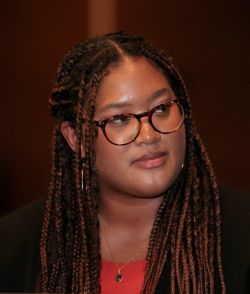 Calyssa (she/her/hers) is a Master of International Development Practice (MDP) candidate at the University of Waterloo and is interested in applying intersectional approaches to gender and equity in global and community-based sustainability, development and enterprise-based environments.
Calyssa (she/her/hers) is a Master of International Development Practice (MDP) candidate at the University of Waterloo and is interested in applying intersectional approaches to gender and equity in global and community-based sustainability, development and enterprise-based environments.
